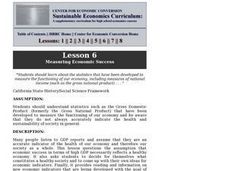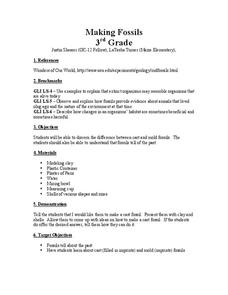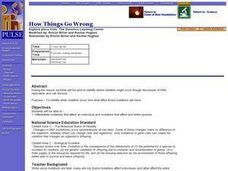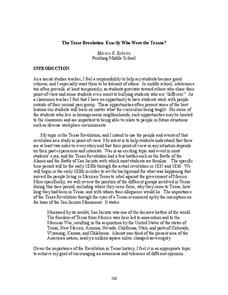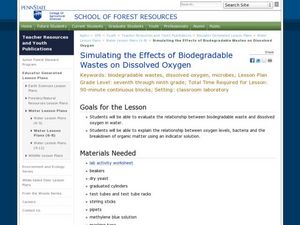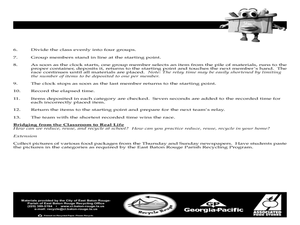Curated OER
What Does My Bacteria Look Like?
Students identify Gram positive and Gram negative bacteria using staining techniques. Students research importance of identification of bacterial types in diagnosing bacterial diseases.
Curated OER
Illusions of Depth
Third graders practice drawing a landscape to show an illusion of depth. In the drawing, they can put whatever objects they choose to but have to remember to show depth. They explain how overlapping and size differences show...
Curated OER
Measuring Economic Success
Students are introduced to the Gross Domestic Product and what this number tells us about the economy of the United States. In groups, they discuss what constitutes a healthy society and if the GDP is an accurate representation. They...
Curated OER
Making Fossils
Third graders examine the differences between cast and mold fossils. They discuss geological time and how many fossils are millions of years old, then create a cast fossil using clay and a shell, and a mold fossil using a shell and...
Curated OER
How Things Go Wrong
Students identify where mutations might occur and examine what effect those mutations will have through class discussion of DNA replication and cell division. Students then differentiate between mutations that affect individuals and...
Curated OER
Weathering Rates
Students calculate weathering rates from tombstone weathering data. Atmospheric (and precipitation) chemistry determines the rate of weathering for marble tombstones. They are shown data from a rural and an unrban cemetery, and are...
Curated OER
The Texas Revolution: Exactly Who Were The Texans?
Students examine the Texas Revolution. In groups, they use the internet to research who the Texans really were and the reasons behind the revolution. They discuss the need to discover the world outside of school and work with people...
Curated OER
On the Road with Marco Polo: Crossing the Deserts of China
Students explore the geography of China. They describe the geography of the Taklimakan. Students discover the best route to travel from one end of the desert to the other. They investigate how some of the local inhabitants make a...
Curated OER
Pond Life Identification Kit
Students explore ecology and biodiversty. They use the wet-mount procedure to make several slides to view using the microscope and draw what they see.
Curated OER
social studies: Life in Colonial America
Students explore the trials and tribulations early colonial life and note its successes. Through literature, Internet research, and interactive software, they engage in various activities to evaluate early social and cultural development.
Curated OER
Medieval Law and Order (Lower)
In this Medieval Law and Order worksheet, students read and see visuals of the different types of punishments given to people who committed crimes. Students then answer three questions about what they read.
Curated OER
These Lakes are Great
Young scholars examine the Great Lakes Basin and water conservation. In this Great Lakes and water lesson, students study the location of the lakes before reading the book, The River Ran Wild. They discuss the associated vocabulary and...
Curated OER
Simulating the Effects of Biodegradable Wastes on Dissolved Oxygen
Young scholars evaluate the relationship between biodegradable waste and dissolved oxygen in water. In this biodegradable wastes lesson students complete a lab activity in groups then analyze their results.
Curated OER
The Human Organism
Learners discuss human emotions and mental health. In this mental and emotional health instructional activity, students write a short story regarding the "think and share" choice. Learners include emotion, the connection between...
Curated OER
Sorting
Students study how things are stored and how information is retrieved. In this investigative lesson students play a game that helps them to see how things are sorted in a library.
Curated OER
Creation Stories
High schoolers explore Native American creation stories. In this Native American instructional activity, students research Native American culture, social structure, and religious beliefs as they compare and contrast the different...
Curated OER
It's a Wrap!
Pupils read about the importance of packaging foods and related items properly and reducing waste. In this packaging lesson, students read the background information about packaging and bring a variety of packaging materials to class....
Curated OER
Owning a Dog: Reading Comprehension
In this reading comprehension worksheet, students read the five paragraph essay about the effects of children owning a dog. Then they answer 10 questions to indicate comprehension of the selection.
Curated OER
Dunk It! Don't Junk It!
Third graders explore the concept of sorting recyclables. In this recycling lesson, 3rd graders determine how to separate recyclables from waste and how to sort recyclables into different categories.
Curated OER
Intertidal Field Trip
Young scholars explore an intertidal zone. For this science lesson, students travel to an intertidal zone. Young scholars collect data and create species accumulation curves.
Curated OER
Abuela's Weave Teacher's Guide
Young scholars read and response to the book, Abuela's Weave. In this African-American literature instructional activity, students discuss pre-reading questions, that focus on family traditions and make predictions about the text. Young...
Curated OER
Hula Hoop Habitats
Students explore migration. In this science lesson, students play a game in which they explore bird migration. Students discuss the needs of birds and play a game in which they "migrate" in order to meet their needs.
Curated OER
Look At Those Leaves!
Students explore botany by researching plants in class. For this tree identification lesson, students examine a group of leaves and list the different characteristics before guessing what types of trees they came from. Students read...
Curated OER
"Hector's World" Episode 5
Young scholars consider when, and if, they should share information about themselves over the internet. In this online safety lesson, students view the show "Hector's World." They then discuss how to use caution, unsafe feelings, and the...




